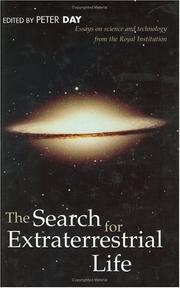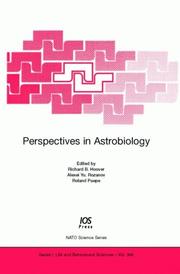| Listing 1 - 10 of 80 | << page >> |
Sort by
|

ISBN: 1283924692 0191506141 9780191506147 0198504144 9780198504146 Year: 1998 Publisher: Oxford New York Oxford University Press
Abstract | Keywords | Export | Availability | Bookmark
 Loading...
Loading...Choose an application
- Reference Manager
- EndNote
- RefWorks (Direct export to RefWorks)
This volume of selected Evening Discourses from the Royal Institution offers an authoritative and accessible summary of current thinking in many areas of science and technology. The subjects are wide-ranging, from studies of Venus and what they tell us about the Earth, the history and possible future of television, to the interface between art and science - using spectroscopy to analyse the pigments in Medieval manuscripts. Will we be able to build machines with molecular-basedmemories? How do you deal with an historic tower `founded on jelly and slowly inclining to the point at which it is ab
Life on other planets. --- Extraterrestrial life --- Planets --- Fermi's paradox
Book
ISBN: 1009207369 1009207350 1009207342 Year: 2023 Publisher: Cambridge, United Kingdom ; New York, NY : Cambridge University Press,
Abstract | Keywords | Export | Availability | Bookmark
 Loading...
Loading...Choose an application
- Reference Manager
- EndNote
- RefWorks (Direct export to RefWorks)
The two most fascinating questions about extraterrestrial life are where it is found and what it is like. In particular, from our Earth-based vantage point, we are keen to know where the closest life to us is, and how similar it might be to life on our home planet. This book deals with both of these key issues. It considers possible homes for life, with a focus on Earth-like exoplanets. And it examines the possibility that life elsewhere might be similar to life here, due to the existence of parallel environments, which may result in Darwinian selection producing parallel trees of life between one planet and another. Understanding Life in the Universe provides an engaging and myth-busting overview for any reader interested in the existence and nature of extraterrestrial life, and the realistic possibility of discovering credible evidence for it in the near future.
Life on other planets. --- Extraterrestrial life --- Planets --- Fermi's paradox
Book
ISSN: 03796566 ISBN: 9290928069 9789290928065 Year: 2001 Volume: 496 Publisher: Noordwijk : ESA
Abstract | Keywords | Export | Availability | Bookmark
 Loading...
Loading...Choose an application
- Reference Manager
- EndNote
- RefWorks (Direct export to RefWorks)
Life on other planets --- Exobiology --- Extraterrestrial life --- Planets --- Fermi's paradox --- Astrobiology --- Biology --- Habitable planets --- Life --- Origin --- Congresses.
Book
ISBN: 160805473X 9781608054732 9781608055999 Year: 2013 Publisher: [Sharjah, U.A.E.] Bentham Science Publishers
Abstract | Keywords | Export | Availability | Bookmark
 Loading...
Loading...Choose an application
- Reference Manager
- EndNote
- RefWorks (Direct export to RefWorks)
Astrobiology refers to the study of the origin, evolution, distribution, and future of life in the universe. This encompasses extraterrestrial life and life on Earth. Astrobiology is an interdisciplinary field that is gaining a rapidly growing interest among both the general public and the astronomical research community. This e-book explains the detection and evolution of exoplanets and discusses the question of habitability on such objects. Chapters in this text include cited references enabling the reader to acquire more information on specific aspects of astrobiology. It is also a suitable
Exobiology. --- Life on other planets. --- Astrobiology --- Biology --- Habitable planets --- Life --- Extraterrestrial life --- Planets --- Fermi's paradox --- Origin
Book
ISBN: 0300224753 9780300224757 9780300208696 0300208693 Year: 2016 Publisher: New Haven Yale University Press
Abstract | Keywords | Export | Availability | Bookmark
 Loading...
Loading...Choose an application
- Reference Manager
- EndNote
- RefWorks (Direct export to RefWorks)
Where would you look for alien life? An astronomer and science popularizer explains the basics of astrobiology to outline five plausible scenarios for finding extraterrestrials Long before space travel was possible, the idea of life beyond Earth transfixed humans. In this fascinating book, astronomer Jon Willis explores the science of astrobiology and the possibility of locating other life in our own galaxy. Describing the most recent discoveries by space exploration missions, including the Kepler space telescope, the Mars Curiosity rover, and the New Horizons probe, Willis asks readers to imagine-and choose among-five scenarios for finding life. He encourages us to wonder whether life might exist within Mars's subsoil ice. He reveals the vital possibilities on the water-ice moons Europa and Enceladus. He views Saturn's moon Titan through the lens of our own planet's ancient past. And, he even looks beyond our solar system, investigating the top candidates for a "second Earth" in a myriad of exoplanets and imagining the case of a radio signal arriving from deep space. Covering the most up-to-date research, this accessibly written book provides readers with the basic knowledge necessary to decide where they would look for alien life.
Exobiology. --- Life on other planets. --- SCIENCE / Astronomy. --- Extraterrestrial life --- Planets --- Fermi's paradox --- Astrobiology --- Biology --- Habitable planets --- Life --- Origin

ISSN: 15667693 ISBN: 9781586035129 1586035126 Year: 2005 Volume: v. 366 Publisher: Amsterdam : IOS Press,
Abstract | Keywords | Export | Availability | Bookmark
 Loading...
Loading...Choose an application
- Reference Manager
- EndNote
- RefWorks (Direct export to RefWorks)
Astrobiology is the multi-disciplinary field devoted to the investigation of the origin; physical, chemical and environmental limitations; and the distribution in space and time of life on Earth and in the Cosmos. Astrobiology seeks an answer to one of the most fundamental of all questions: - Is Life Restricted to Planet Earth or is Life a Cosmic Imperative? Understanding the characteristics, properties, habits and diversity of living organisms on Earth is crucial to determine where and how to search for evidence of life elsewhere.
Exobiology --- Life on other planets --- Astrobiology --- Extraterrestrial Life --- Life, Extraterrestrial --- Exobiologie --- Vie extraterrestre --- Congresses. --- Congrès --- Extraterrestrial Environment --- Space Biology --- Biologies, Space --- Biology, Space --- Space Biologies --- Space Research
Book
ISSN: 03796566 ISBN: 9290925205 9789290925200 Year: 1999 Volume: 1231 Publisher: Noordwijk ESA
Abstract | Keywords | Export | Availability | Bookmark
 Loading...
Loading...Choose an application
- Reference Manager
- EndNote
- RefWorks (Direct export to RefWorks)
Bibliothèque Houziaux
Life on other planets. --- Exobiology. --- Exobiology --- Life on other planets --- Extraterrestrial life --- Planets --- Fermi's paradox --- Astrobiology --- Biology --- Habitable planets --- Life --- Origin --- Mars (Planet) --- -Exploration --- Exploration.
Book
ISBN: 2246479312 Year: 1994 Publisher: Paris : Bernard Grasset,
Abstract | Keywords | Export | Availability | Bookmark
 Loading...
Loading...Choose an application
- Reference Manager
- EndNote
- RefWorks (Direct export to RefWorks)
Cosmology --- Extraterrestrial anthropology --- Life on other planets --- Extraterrestrial life --- Planets --- Fermi's paradox --- Anthropology --- Interplanetary voyages --- Space sciences --- Astronomy --- Deism --- Metaphysics --- Centers of origin --- Evolution --- Life history

ISBN: 0521359864 0521263050 Year: 1986 Publisher: Cambridge Cambridge University press
Abstract | Keywords | Export | Availability | Bookmark
 Loading...
Loading...Choose an application
- Reference Manager
- EndNote
- RefWorks (Direct export to RefWorks)
Plurality of worlds --- Worlds, Plurality of --- Extraterrestrial life --- Fermi's paradox --- Plurality of worlds. --- Life on other planets. --- Life on other planets --- Astronomy --- Cosmology --- Planets --- Stars
Book
ISBN: 0128099364 0128099356 9780128099360 9780128099353 Year: 2018 Publisher: Amsterdam, Netherlands ; Oxford, England ; Cambridge, Massachusetts : Elsevier,
Abstract | Keywords | Export | Availability | Bookmark
 Loading...
Loading...Choose an application
- Reference Manager
- EndNote
- RefWorks (Direct export to RefWorks)
From Habitability to Life on Mars explores the current state of knowledge and questions on the past habitability of Mars and the role that rapid environmental changes may have played in the ability of prebiotic chemistry to transition to life. It investigates the role that such changes may have played in the preservation of biosignatures in the geological record and what this means for exploration strategies. Throughout the book, the authors show how the investigation of terrestrial analogs to early Martian habitats under various climates and environmental extremes provide critical clues to understand where, what and how to search for biosignatures on Mars. The authors present an introduction to the newest developments and state-of-the-art remote and in situ detection strategies and technologies that are being currently developed to support the upcoming ExoMars and Mars 2020 missions. They show how the current orbital and ground exploration is guiding the selection for future landing sites. Finally, the book concludes by discussing the critical question of the implications and ethics of finding life on Mars.--
Mars (Planet) --- Red Planet --- Life on other planets. --- Habitable planets. --- Extraterrestrial life --- Planets --- Fermi's paradox --- Earth-like planets --- Earthlike planets --- Extrasolar planets --- Exobiology
| Listing 1 - 10 of 80 | << page >> |
Sort by
|

 Search
Search Feedback
Feedback About UniCat
About UniCat  Help
Help News
News